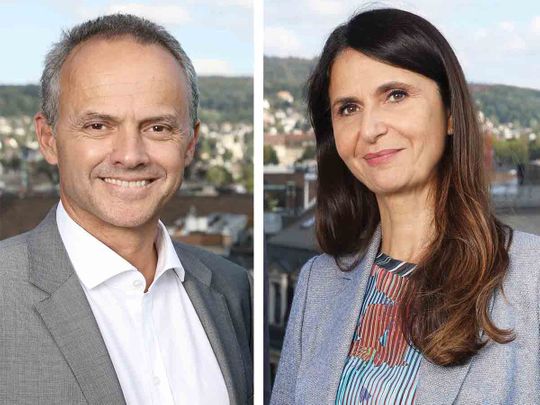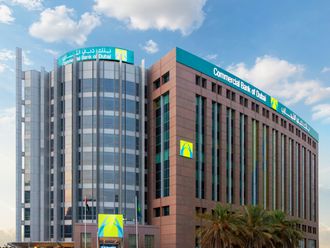
Dubai: Anything related to healthcare would have caught investor attention during the darkest phase of the slow Covid burnout through 2020-21. Investments were pouring into ventures that were into potential cures (not just for Covid), digital delivery of health services, and even making supply chains faster in the delivery of live-saving medicines.
But with those threats receding into the distance, does healthcare still figure front and center of global investors’ attention span? The UK banking behemoth HSBC does seem to think that it does, having introduced a healthcare focused fund. The HSBC Global Equity Sustainable Healthcare Fund picks out those entities that stand to benefit long-term from the ongoing trend of rising healthcare costs. The chosen ones could replace existing treatment regimes or reduce cost of care. They could even focus on disease prevention.
Talking about the Fund are Dr. Michael Schroter and Dr. Nathalie Flury, senior global portfolio managers at HSBC.
The impression is that in healthcare investments, it’s the pharma and biomedicine companies that are in the spotlight, and less so on hospital operators. Your thoughts?
Dr. Schroter: Healthcare is diverse - pharma, biotech, medical devices, diagnostics, hospitals, service provides, tools, manufacturing and digital health. Each subsector has unique characteristics; for instance, biotech is mostly very growth-focused and tends to be a riskier investment.
Hospitals and service providers are mostly stable, cash-flow positive companies and hence more defensive. The diverse nature provides investors with the whole spectrum, from very defensive to very growth focused investments and hence the ability to adapt the investment mix to the macro economic environment and risk appetite.
That’s the approach we take with our fund.
The sentiment seems to be to bet on cutting-edge healthcare/pharma R&D firms – which is what some of the biggest global investors are already doing. Do you reckon these entities are ready for IPO plays?
Dr. Schroter: IPOs across a range of sectors are growing throughout the Middle East region at present. Healthcare is an innovation-driven sector – no patient wants second best care. Thus for companies to develop new products or services which deliver improved clinical benefits is crucial.
And increasingly though companies need to address payer - i.e., government and insurance company - needs. These payers are faced with rising healthcare costs whilst needing to serve a growing and aging population. Payers are forced to make trade-off decisions on what and how much they reimburse.
Both listed and private companies need to adapt to this change in customer needs and offer affordable innovation without impacting their profit margins. This is a challenge, but at the same time it provides an opportunity for private companies and if managed appropriately will position them well for a successful IPO.
Year to date, have there been any healthcare linked IPO plays/investor exits that have caught your eye?
Dr. Flury: Currently the IPO market is almost closed in most parts of the world, with the Middle East a notable exception. As of mid-2022, both the number of biotech/healthcare companies going public and the average amount of money raised continue to be well below the soaring valuations only a year ago.
Compared with the 45 biotech that went public in 2021, only 14 have gone public by the same time this year. Of these, 10 are trading below their initial offering price as of end June 2022.
There have been some healthcare M&A’s this year globally, although fewer than in the years before e.g. Biohaven (a HSBC Sustainable Healthcare position at the time) has been bought out by Pfizer with a premium of +70 per cent.
The Gulf, particularly the UAE and Saudi Arabia, have had a few healthcare entities testing the public markets, and with a degree of success. Do you expect more?
Dr. Flury: With the developments taking place here, we do expect more to come. In every market you can observe that when wealth rises, demand for healthcare increases. This provides opportunities for healthcare companies to address this growing need, and changing customer needs.
For investors, this means that just looking at the clinical benefit a healthcare product or service is delivering is no longer sufficient. The product must also be affordable, and the only way to balance affordability with profitability is innovating to deliver a product which reduces overall healthcare cost despite being high priced.
The HSBC Sustainable Healthcare Fund – how much have you raised by way of funds?
Dr. Schroter: The HSBC Sustainable Healthcare fund was launched in July 2021 and has around $120 million in assets. The ‘long-only’ fund is invested in around 40 stocks, companies that are likely to benefit long term from the ongoing trend of rising healthcare costs.
These companies focus on innovative high-priced medical solutions which offer clinical benefits to patients and at the same time help reduce the overall healthcare spend. Examples include replacing current expensive treatments with those of greater effectiveness; or by prevention instead of treatment; cure instead of treating a disease chronically; or by reducing hospital readmission, reducing time for the patient to recover or improving operational efficiencies.
This is a Luxembourg UCITS fund with a minimum of $1000 investment and daily liquidity.
Are you looking at pre-IPO entities in the main?
Dr. Flury: We regularly review pre-IPO companies to assess what sectors and companies will feature in future listing rounds. We invest in companies going through an IPO if their products or services have the right value proposition for patients and payers (government or insurance companies) and the company valuation is attractive. With that as a pre-requisite, a company going IPO can be a good addition to a diversified portfolio of stocks which we hold in the fund.










